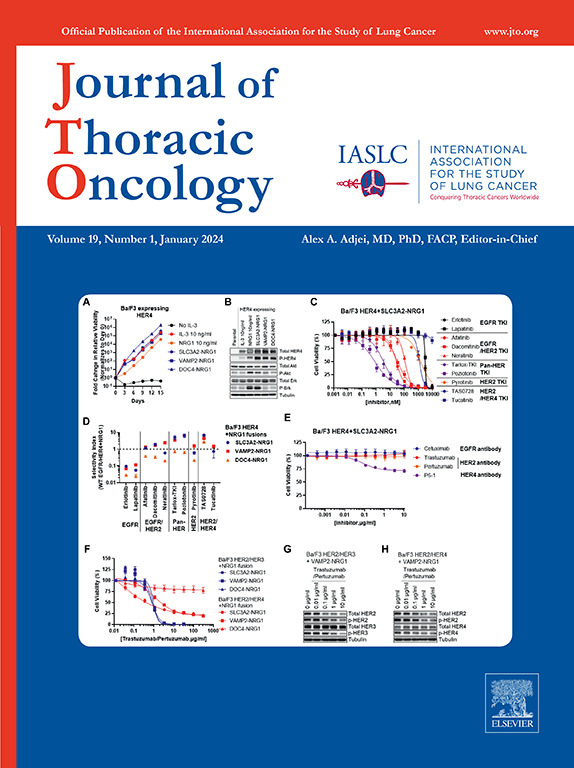FGTI-2734 抑制 ERK 再激活,克服 KRAS G12C 肺癌患者对索托拉西布的耐药性
IF 21
1区 医学
Q1 ONCOLOGY
引用次数: 0
摘要
KRAS G12C 靶向疗法,如索托拉西(sotorasib),是一项重大突破,但 KRAS G12C 肺癌患者的总体反应率和无进展生存期并不高,这是因为出现了涉及 ERK 适应性再激活的耐药机制,而 ERK 需要野生型(WT)HRAS 和 NRAS 膜定位。在这里,我们证明了法尼基转移酶(FT)和香叶基转移酶-1(GGT-1)双重抑制剂FGTI-2734能抑制WT RAS膜定位和索托拉西布诱导的ERK反馈再激活,并克服索托拉西布的适应性耐药。FGTI-2734 和 sotorasib 的组合能协同抑制 KRAS G12C 肺癌细胞的活力并诱导其凋亡,包括那些对 sotorasib 高度耐药的细胞。FGTI-2734 可增强索托拉西布在体内的抗肿瘤活性,从而使来自 KRAS G12C 肺癌患者的异种移植物 (PDX) 以及几种对索托拉西布高度耐药的 KRAS G12C 人类肺癌细胞的异种移植物的肿瘤显著消退。重要的是,用FGTI-2734治疗小鼠可抑制索托拉西布诱导的KRAS G12C PDX中的ERK再激活,用FGTI-2734和索托拉西布联合治疗小鼠在体内抑制索托拉西布耐药的人KRAS G12C肺癌异种移植物以及PDX中的P-ERK水平也明显更有效。我们的研究结果为克服索托拉西布耐药性和改善 KRAS G12C 肺癌的治疗效果奠定了基础。本文章由计算机程序翻译,如有差异,请以英文原文为准。
FGTI-2734 Inhibits ERK Reactivation to Overcome Sotorasib Resistance in KRAS G12C Lung Cancer
Introduction
KRAS G12C targeted therapies, such as sotorasib, represent a major breakthrough, but overall response rates and progression-free survival for patients with KRAS G12C lung cancer are modest due to the emergence of resistance mechanisms involving adaptive reactivation of ERK, which requires wild-type HRAS and NRAS membrane localization.
Methods and Results
Here, we demonstrate that the dual farnesyltransferase and geranylgeranyltransferase-1 inhibitor FGTI-2734 inhibits wild-type RAS membrane localization and sotorasib-induced ERK feedback reactivation, and overcomes sotorasib adaptive resistance. The combination of FGTI-2734 and sotorasib is synergistic at inhibiting the viability and inducing apoptosis of KRAS G12C lung cancer cells, including those highly resistant to sotorasib. FGTI-2734 enhances sotorasib’s anti-tumor activity in vivo leading to significant tumor regression of a patient-derived xenograft (PDX) from a patient with KRAS G12C lung cancer and several xenografts from highly sotorasib-resistant KRAS G12C human lung cancer cells. Importantly, treatment of mice with FGTI-2734 inhibited sotorasib-induced ERK reactivation in KRAS G12C PDX, and treatment of mice with the combination of FGTI-2734 and sotorasib was also significantly more effective at suppressing in vivo the levels of P-ERK in sotorasib-resistant human KRAS G12C lung cancer xenografts and the NSCLC PDX.
Conclusion
Our findings provide a foundation for overcoming sotorasib resistance and potentially improving the treatment outcomes of KRAS G12C lung cancer.
求助全文
通过发布文献求助,成功后即可免费获取论文全文。
去求助
来源期刊

Journal of Thoracic Oncology
医学-呼吸系统
CiteScore
36.00
自引率
3.90%
发文量
1406
审稿时长
13 days
期刊介绍:
Journal of Thoracic Oncology (JTO), the official journal of the International Association for the Study of Lung Cancer,is the primary educational and informational publication for topics relevant to the prevention, detection, diagnosis, and treatment of all thoracic malignancies.The readship includes epidemiologists, medical oncologists, radiation oncologists, thoracic surgeons, pulmonologists, radiologists, pathologists, nuclear medicine physicians, and research scientists with a special interest in thoracic oncology.
 求助内容:
求助内容: 应助结果提醒方式:
应助结果提醒方式:


